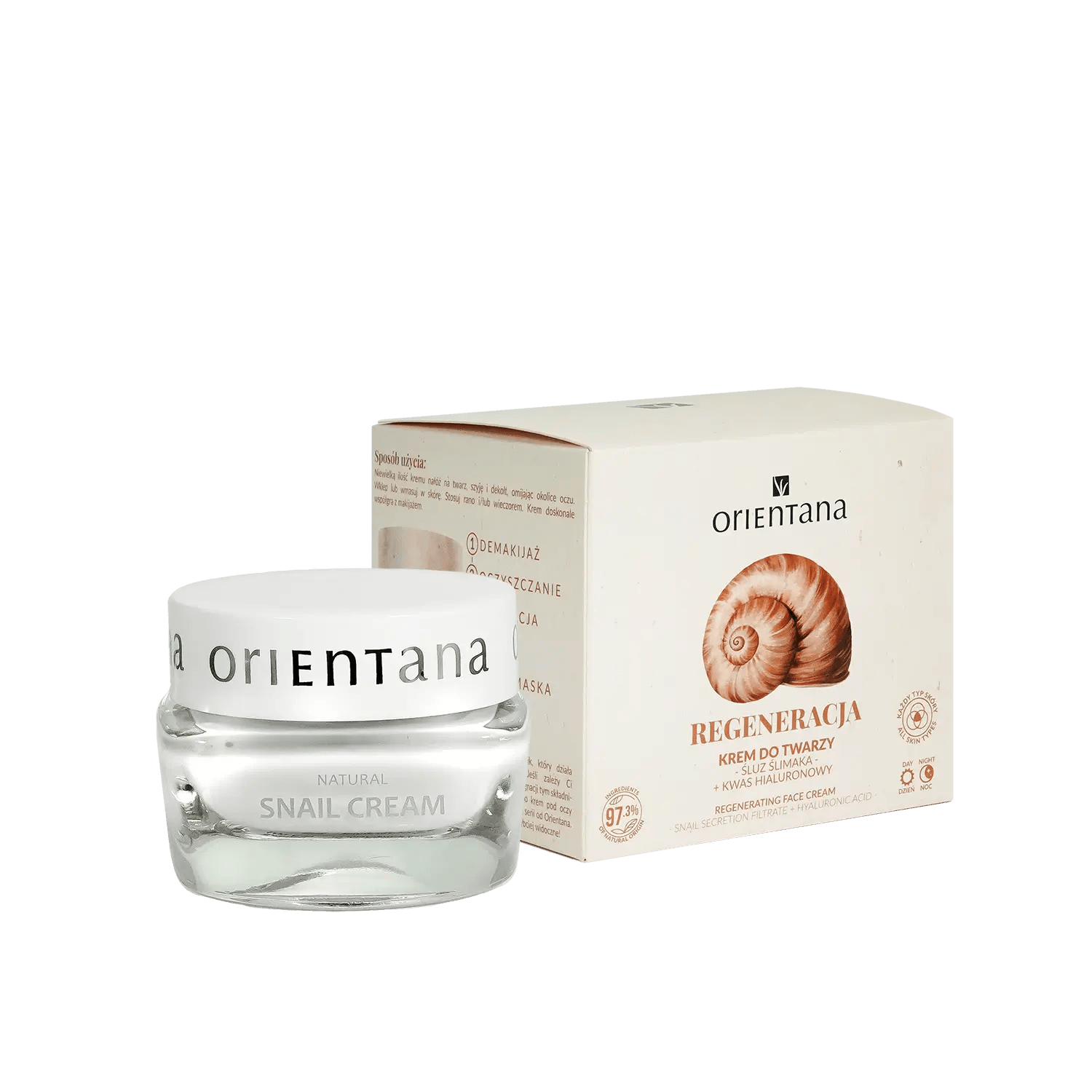21st-century cosmetology is increasingly turning to biotechnology to create ingredients inspired by nature, yet more stable, safe, and ethical. One such discovery is phytomucine – a biotechnological equivalent of snail slime, extracted from plants. It is most commonly used in the form of aloe phytomucine (Fermentage ALOEVERA) , which has powerful moisturizing, smoothing, and soothing properties.
In this article you will learn:
-
what is phytomucine and how does it work,
-
why it can replace the popular but controversial snail slime,
-
what are its effects confirmed by research,
-
and you will learn about the Orientana Soothing and Smoothing Serum with Aloe Mucin , which uses this innovation in anti-aging care.
1. What is phytomucin?
Phytomucine is a modern active ingredient developed through biotechnology. It is a plant-based alternative to snail slime. It is obtained, among other things, by fermenting aloe vera with lactic acid bacteria (Lactobacillus) .
The fermentation process allows aloe leaves to produce a unique concentrate of active molecules:
-
lactic acid and its salts (lactates) – natural NMF factors responsible for binding water in the skin,
-
potassium (K+) – a key electrolyte supporting proper hydration of the epidermis,
-
bioactive metabolites – supporting skin renewal processes and immunity.
Phytomucin works similarly to animal mucin (snail slime) – it smoothes, regenerates and intensively moisturizes – but it is fully vegan, ethical and stable .
2. Phytomucine and traditional snail slime – differences and advantages
Snail slime has been known in cosmetology for years as a regenerating and anti-aging ingredient. However, it has several disadvantages:
-
its acquisition raises ethical questions,
-
the composition of mucus is variable and difficult to standardize,
-
products can be unstable and may vary in effectiveness.
Aloe phytomucin eliminates these problems:
-
is made from a plant – it is fully vegan ,
-
its biotechnological process ensures stability and repeatability of the composition ,
-
Research confirms its effectiveness in moisturizing, smoothing and protecting the skin against inflammation.
This makes it an ethical and modern alternative to cosmetics with snail slime.
3. Mechanism of action of aloe phytomucine (Fermentage ALOEVERA)
a) Providing NMF – natural moisturizing factor
Studies have shown that phytomucine delivers lactate (lactic acid) and potassium ions to the skin, which are essential elements of the Natural Moisturizing Factor (NMF) .
👉 Effect: the skin becomes better hydrated, soft and elastic .
b) Protection against YURAGI skin
In Japan, there is a concept called YURAGI skin – meaning “unstable skin” that reacts to environmental factors:
-
temperature fluctuations,
-
pollution, pollen,
-
stress, UV, makeup residue.
Over 50% of Japanese women suffer from these problems. Phytomucine from aloe stabilizes the skin, reducing its reactivity and hypersensitivity.
c) Anti-inflammatory effect
Fermentage ALOEVERA inhibits excessive production of pro-inflammatory cytokines (IL-1α, IL-6) in dry skin conditions.
👉 Effect: less irritation, lower risk of dryness and micro-inflammatory damage.
4. Effects confirmed by research
Data from in vivo and in vitro studies show that:
-
67% of people using phytomucine noticed an improvement in skin hydration,
-
After 4 weeks of use , the skin texture improved and became smoother ,
-
phytomucine effectively reduces inflammation caused by dryness .
These results make it an ingredient that is not only moisturizing, but also neuro-calming , i.e. restoring skin comfort and balance.
5. Serum with phytomucine from Orientana – Neuro-Calm Skin Refining Serum
One of the first Polish products using this innovative ingredient is Orientana Soothing and Smoothing Serum with Aloe Mucin .
Active ingredients:
-
Aloe phytomucine (Fermentage ALOEVERA) – intense hydration, smoothing, reduction of skin reactivity.
-
Lactobionic acid – a delicate polyhydroxy acid (PHA) that supports epidermal renewal, strengthens the hydrolipid barrier and has antioxidant properties.
-
Hyaluronic acid – binds water in the skin, providing long-lasting hydration.
Serum action:
-
soothes irritations and inflammation,
-
smoothes the skin structure and improves its texture,
-
restores elasticity and softness,
-
increases the skin's resistance to external factors.
Orientana application research results:
-
100% of people confirmed improvement in skin elasticity,
-
100% noticed a feeling of relief,
-
96% of people said their skin became silky smooth.
👉 The serum can be used daily, morning and evening, on cleansed and toned skin.
6. How to use cosmetics with phytomucine?
To fully utilize the potential of phytomucine:
-
Cleanse your skin with a gentle gel or foam.
-
Apply a toner – preferably one with moisturizing and soothing properties.
-
Apply a few drops of phytomucin serum to slightly damp skin.
-
Pat in a moisturizing cream or regenerating mask.
💡 Expert advice: Always apply the serum to damp skin – then the phytomucine binds water better and the moisturizing effect is intensified.
7. Why is phytomucine the ingredient of the future?
Phytomucine fits into the most important cosmetic trends:
-
biotechnology – modern, safe and stable raw materials,
-
vegan care – an alternative to snail slime,
-
clean beauty – ingredients of natural origin, without unnecessary additives,
-
effectiveness confirmed by research – not just marketing, but real action.
It can be expected that in the coming years phytomucine will find wide application not only in serums, but also in creams, masks and cosmetics for sensitive skin care.
8. Summary – who is phytomucine for?
Phytomucine is an ingredient recommended for those who want to combine effectiveness with ethics . It is perfect for skincare:
-
dry and dehydrated skin,
-
sensitive and reactive skin, exposed to YURAGI skin ,
-
mature skin requiring firming and smoothing,
-
stressed, irritated and dull skin.
👉 If you are looking for a cosmetic with this innovative ingredient, try Orientana – Soothing and Smoothing Serum with Aloe Mucin , which combines aloe phytomucin with hyaluronic and lactobionic acid, offering comprehensive anti-aging care.
FAQ – most frequently asked questions about phytomucine
What is phytomucine and how does it affect the skin?
Phytomucine is a plant-based alternative to snail slime, obtained from aloe vera through a fermentation process. It intensely moisturizes, smooths, and soothes the skin.
Can phytomucine replace snail slime?
Yes – it works very similarly, but it is stable, repeatable, fully vegan and ethical.
Which cosmetics with phytomucine are worth choosing?
It is best to use a serum – e.g. Orientana Soothing and Smoothing Serum with Aloe Mucin , which gives quick and visible results.
Is phytomucin serum suitable for sensitive skin?
Yes, because phytomucine soothes inflammation, reduces hyperreactivity and supports the hydrolipid barrier.
How long do you need to use the serum to see the effects?
The first effects (moisturization, soothing) are visible after just a few days, and after 4 weeks, tests confirm improvement in skin texture.






